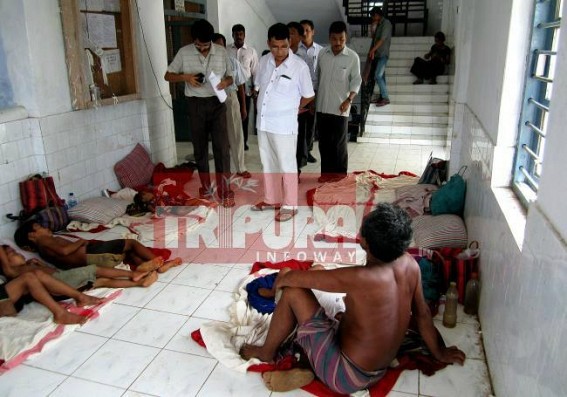TIWN

AGARTALA, March 13 (TIWN):Tripura, the smallest state in the Northeast, has been in the grip of a malaria outbreak for long. Malaria remains as an important public health problem in Malaria and enteric diseases are very common here. More Than 100 Die as Tripura Battles Malaria in the year 2014. However, the reasons for the latest deadly outbreak, are unclear. The region behind is deforestation.
Deforestation is having another worrisome effect: an increase in the spread of life-threatening diseases such as malaria and dengue fever.
For a host of ecological reasons, the loss of forest can act as an incubator for insect-borne and other infectious diseases that afflict humans.
Cutting down large swaths of forests is a major factor in a serious human health problem - the outbreak of some of the world's most serious infectious diseases that emerge from wildlife and insects in forests.
Some 60 percent of the diseases that affect people spend part of their life cycle in wild and domestic animals. Mosquitoes are not the only carriers of pathogens from the wild to humans.
Bats, primates, and even snails can carry disease, and transmission dynamics change for all of these species following forest clearing, often creating a much greater threat to people.
Deforestation created other conditions conducive to mosquito breeding. Leaves that once made streams and ponds high in tannins disappear, which lowers the acidity and makes the water more turbid, both of which favor the breeding of some species of mosquito over others.
Flowing water is dammed up, deliberately and inadvertently, and pools.
Because it is no longer taken up and transpired by trees, the water table rises closer to the forest floor, which can create more swampy areas. As agriculture replaces forest, "re-growth of low lying vegetation provides a much more suitable environment" for the mosquitoes that carry the malaria parasite.
Moreover for a state like Tripura with a population of 37 lakhs , the funds were sufficient but utilization was poor. But health experts squarely blame the state government for their under-preparedness to handle the crisis. The critics say that the number of doctors is very low in worst-affected areas.
- BJP leader Kajal Das was arrested after a Video reeled Viral on Social Media during an Attack on the Presiding Office on East Tripura Lok Sabha Poll day
- Hotel manager was attacked by youths centering power-cut
- 1 critical after road accident in Bishalgarh By-Pass road
- Power outage rattles public lives across Kailashahar : Protest for water continues
- Massive fire left two injured in Dharmanagar



